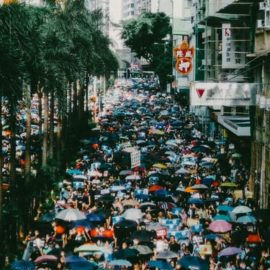

This article is an excerpt from the Shortform book guide to "Thank You for Being Late" by Thomas L. Friedman. Shortform has the world's best summaries and analyses of books you should be reading.
Like this article? Sign up for a free trial here .
Is morality still relevant in today’s society? How does the current state of morality differ from the past? What were the main factors that brought about this change?
According to Thomas Friedman, the author of Thank You for Being Late, the state of societal morality is changing fast as globalization and technological change are taking over the world. To keep up with these accelerations, we need to rethink morality by including ethics in education and building strong communities.
In this article, we’ll discuss modern morality and what we can do to adapt our moral compass to the changes brought about by globalization and the increasing interconnectedness of the world.
The Current State of Morality
According to Thomas Friedman, there are two major components to societal morality today: 1) as a result of the three accelerations, almost everyone has godlike powers, and 2) the acceleration of technology has created new, digital spaces that are impossible for anyone, moral or not, to govern.
Everyone Has Godlike Powers
Today, we have more free will than ever and almost everyone has access to godlike powers. For example, technology and globalization allow an individual to affect people all over the world, and humanity as a whole is changing the climate. Because everyone can be a god, people’s individual sense of right and wrong affect everyone—a single person can destroy the world, and a single person can make life better for everyone.
Ungoverned Spaces
The acceleration of technology, in particular, has created new, digital spaces that are impossible for any religious institution, political leader, or individual to govern or enforce the use of morals. As a result, more spaces have the potential to be godless and lawless.
Example #1: The YouTube ads that run before videos are assigned by an algorithm, not by YouTube staff or the companies who buy the ads. As a result, no one actually knows where the ad will be placed unless she happens upon the video the algorithm selected. This algorithm has resulted in Aveeno, Secret, and Bud Light ads playing in advance of jihadi and ISIS videos. The algorithm had no human judgment to inform its selections.
Example #2: App developers have come up with “ghost apps” that allow users to hide photos and documents on their phones. The apps look like a nondescript default app, often a calculator, until you type in the correct code. In 2015, over 100 high school students in Colorado used one of these apps to share nude photos of themselves. The app allowed teenagers to escape their parents’ governance.
Technology doesn’t have morals, values, or principles, and there are some choices that technology shouldn’t be responsible for. Some work needs to be done by people.
Does God Still Exist?
Today, views on God have to take into account the three accelerations, particularly technology. Depending on which view you subscribe to, there’s a different answer to whether or not God exists in cyberspace:
- If you believe God actively punishes evil, then he isn’t in cyberspace, because cyberspace is full of evil—gambling, pop and rap music with filthy lyrics, and terrorist recruitment—and it hasn’t been struck down yet.
- If you believe that good actions attract God, then God can be present in cyberspace if we act in a moral way and invite him in.
Adapting
In these accelerating times, we need to rethink morality by: 1) including ethics in education, and 2) building strong communities.
Ethical Education
The most obvious way to stop breakers is to create rules and organizations that enforce the rules, such as laws and the FBI. However, rules alone won’t suffice in the age of accelerations. We also need to teach people good values and moral principles so that they’ll behave ethically even when they’re not legally obligated to. (And they often won’t be—technology always evolves faster than the laws that regulate it, as we’ve learned.)
Future leaders, in particular, will need more liberal arts and ethics training in order to make the right choices about technology. The people who understand technology, such as nuclear physicists, aren’t necessarily taught what they should do with that information and ability and may need guidance.
One of the simplest moral principles the author suggests teaching is the Golden Rule—treat others as you want to be treated. The Golden Rule will be effective no matter how much the age of accelerations changes the world because it’s adaptable and scalable and applies to any situation, whether simple or complex.
Building Healthy Communities
In addition to ethical education, another way to develop moral values in people is to make sure everyone is part of a healthy community. Character isn’t usually something that’s developed by an individual; it’s a group effort. Community members watch out for each other and encourage and discourage certain behaviors. If a community as a whole disagrees with a particular behavior—for example, a Palestinian village doesn’t approve of suicide bombing—members of the community will be less likely to engage in these nonapproved behaviors because they don’t want their community members to shame or hate them.
Additionally, the community is aware of what its members are doing and will notice and stop them if they decide to do something destructive.
For example, people who become breakers often don’t have communities. Mohamed Lahouaiej-Bouhlel, the man who drove a truck into a crowd of people in Nice, was a loner. He didn’t know his neighbors—he wouldn’t even return casual greetings—and he had no religious community. It’s hard for anyone to learn the Golden Rule if they don’t have anyone to extend it to.
Because the world is so interconnected, our communities aren’t just our families and neighborhoods anymore; they’re the entire globe. As a result, everyone’s going to succeed, or everyone’s going to fail—the human race will survive, or it won’t, and the only way to survive is to embrace community and interdependency.
The Paris climate agreement is an example of acknowledging a global community. The agreement was designed to slow climate change, which affects everyone on the planet, and 175 countries signed.

———End of Preview———
Like what you just read? Read the rest of the world's best book summary and analysis of Thomas L. Friedman's "Thank You for Being Late" at Shortform .
Here's what you'll find in our full Thank You for Being Late summary :
- The problems that arise when the world changes faster than humanity can adapt
- How to adapt to technology, globalization, and climate change
- The importance of taking time to reflect and reorient






